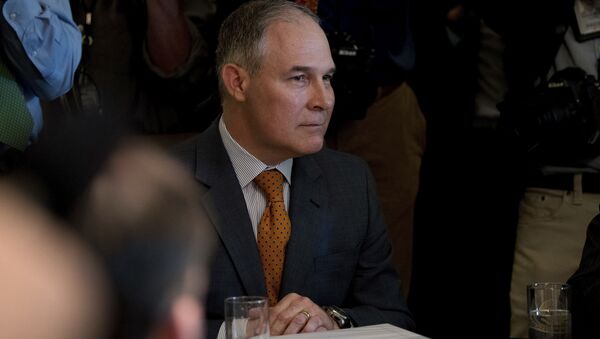The new standards state that the EPA can only use studies based on publicly available data. However, many scientists claim that such guidelines would limit studies in peer-reviewed journals that rely on some data that isn't publicly available but still have valuable information regarding public health and the environment.
Fred Magdoff, author and professor emeritus of plant and soil science at the University of Vermont, told Radio Sputnik's Loud & Clear that though transparency in science is beneficial, its real purpose in this situation is to give industry-funded studies priority.
"I agree, scientific information should be open and available to everybody. So, Pruitt is using certain ideas which don't seem to be a problem, but he's using them in very problematic ways," Magdoff told hosts John Kiriakou and Brian Becker.
"Let me give you an example: When they do health studies on people, people are given anonymity. Their names are not revealed in case, in the future, those people do not want that information released; so, privacy is a very important aspect of studies. And what the EPA is asking for is a complete opening up of all the data, which would prevent studies in which human subjects have anonymity from being used to make regulations," Magdoff told Radio Sputnik.
"Another example is when farmers are involved in studies and they don't want data collected from their farms to be used against them in a court of law, and so they request anonymity. Privacy is really important to get cooperation from people to participate in studies. Otherwise, people won't cooperate with you," Magdoff explained.
On Tuesday, the EPA chief told a group of supporters at the organization's headquarters that "Today is a red-letter day. It's a banner day. The science that we use is going to be transparent. It's going to reproducible," the Washington Post reported.
However, according to Magdoff, some experiments in science are not reproducible because they happen as an accident in nature. In these cases, researchers take advantage of the accident to evaluate what's happening in the environment.
In an interview Tuesday, former EPA administrator Gina McCarthy said that the new standards proposed by Pruitt would prevent the federal government from making regulations based on groundbreaking studies.
"The best studies follow individuals over time so that you can control all the factors except for the ones you're measuring. But it means following people's personal history, their medical history. And nobody would want to expose all of their private information," she told the Washington Post.
"While transparency is nice sounding, the real purpose here is to give industry more leeway. That is what Pruitt is trying to do, and releasing the data doesn't help the public understanding the data," Magdoff told Radio Sputnik.
On Monday, 985 scientists signed a letter created by the Union of Concerned Scientists calling on Pruitt not to enact the policy change.
"There are ways to improve transparency in the decision-making process, but restricting the use of science would improve neither transparency nor the quality of EPA decision-making," the scientists wrote in the letter.
"If fully implemented, this proposal would greatly weaken EPA's ability to comprehensively consider the scientific evidence across the full array of health studies… many public health studies cannot be replicated, as doing so would require intentionally and unethically exposing people and the environment to harmful contaminants or recreating one-time events," they added.





